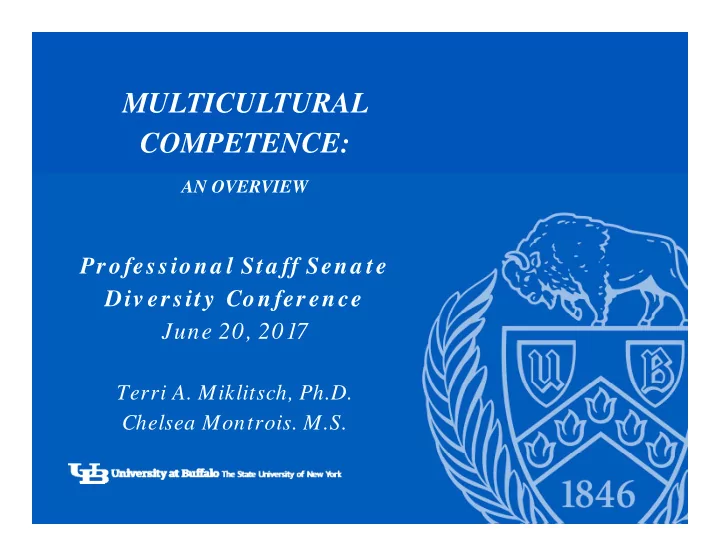

MULTICULTURAL COMPETENCE: AN OVERVIEW Professiona l Sta ff Sena te ‘- Div ersity Conference June 20, 2017 Terri A. Miklitsch, Ph.D. Chelsea Montrois. M.S. 1
OUTLINE Dynamic Model of Student Affairs Competence (Pope, Reynolds & Mueller, 2004) ‘- Case Studies MCOD and Diversity Initiatives 2
Dynamic Model of Administration Multicultural and Management Competence Theory and Translation (Pope, Reynolds, & Mueller, 2004) Multicultural Awareness, Knowledge, & Skills ‘- Ethics and Professional Standards Helping and Advising Teaching and Training Assessment and Research 3
MULTICULTURAL AWARENESS Awareness of one’s attitudes, beliefs, assumptions, biases and values ‘- Awareness of self, the other, and the relationship Understanding one’s own culture and heritage and how they may influence one’s worldview Awareness of one’s abilities and limitations 4
MULTICULTURAL KNOWLEDGE Specific information about others’ cultures ‘- Understanding of the dynamics of oppression Information about relevant theories Knowledge about how race, culture, and other social identifications may affect behaviors, attitudes, feelings and interventions 5
MULTICULTURAL SKILLS Designing appropriate interventions Incorporating learning in new ‘- situations Ability to recover from cultural errors and to tolerate, manage, and resolve intercultural conflict Ability to deconstruct one’s assumptions and core beliefs 6
MULTICULTURAL AWARENESS, KNOWLEDGE AND SKILLS The awareness, knowledge, and skills ‘- needed to work in meaningful ways with others who are culturally different from self Multicultural competence is a distinct category of awareness, knowledge, and skills yet also must be integrated into other core competencies 7
HELPING AND ADVISING All interactions involve diverse worldviews, values, realities and ‘- experiences Cultural similarities and differences affect all helping relationships Use multicultural awareness and knowledge to create responsive and culturally sensitive interventions 8
ASSESSMENT AND RESEARCH Be aware of the assumptions and the cultural variables that influence research ‘- and assessment Infuse multicultural knowledge, skills and awareness into all aspects of assessment and research Be familiar with culturally sensitive research designs and techniques and diverse instruments 9
TEACHING AND TRAINING Infuse multiculturalism into preparation programs to shape the values and knowledge of new ‘- professionals Without multiculturalism, our educational interventions may be incomplete, inaccurate, or irrelevant Incorporate multicultural issues and dynamics into all types of teaching and training 10
ETHICS AND PROFESSIONAL STANDARDS Individuals bring multiple and diverse ethical belief systems to every interaction and ethical dilemma ‘- Make ethical principles more culturally meaningful and appropriate for all individuals The multicultural nature of higher education is at the center of many ethical challenges A fundamental goal of ethical dialogue is the creation of a mutual and respectful community 11
THEORY AND TRANSLATION Examine and identify assumptions, beliefs and limitations of our theoretical ‘- bases Theory translation involves applying theory to our environment so it is important to know how and when environments foster growth Learning and translating theory need to be viewed as a dynamic and evolving process 12
ADMINISTRATION AND MANAGEMENT Administrative and management practices and skills have often fallen short in incorporating multicultural ‘- issues and concerns Paradigm shifts and alternative tools and strategies are essential to creating genuine and lasting multicultural change Focus multicultural interventions on all levels of the institution (individual, group, institution) - MCOD 13
WHY IT MATTERS! Creating, sustaining and nurturing a welcoming and inclusive environment ‘- Our responsibility to be ethical and effective professionals Necessary to understand identity and human development Why it matters to you? 14
CASE STUDIES Dynamic Model of Student Affairs Competence (Pope, Reynolds & Mueller, 2004) ‘- MCOD, Diversity Initiatives and Social Justice framework MCOD/MCIM: First order change deals with the existing structures, homeostasis. Second order change is creating a new way of seeing ; second order change requires new learning; changing relationships and philosophies, collaborative ownership/ Multicultural Change Intervention Matrix etc. (Pope, Reynolds, Mueller, McTighe Musil) Diversity initiatives may involve analyses, audits, strategic plans, etc. (Arredondo) Social Justice framework involves full and equitable participation of people from all social identity groups; understanding power and privilege, etc. (Bell) 15
QUESTIONS, CONCERNS, OBSERVATIONS ? Thank you to the Professional Staff ‘- Senate and the first annual Diversity Conference Committee for your leadership and willingness to promote multicultural competence! 16
Recommend
More recommend